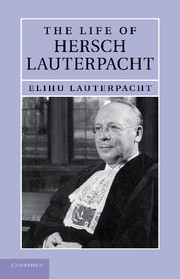Book contents
- Frontmatter
- Contents
- List of plates
- Acknowledgments
- List of abbreviations
- Prologue and introduction
- 1 Background and early years, 1897–1919
- 2 Vienna: research, engagement and marriage, 1919–1923
- 3 England and the London School of Economics, 1923–1937
- 4 Cambridge, 1937–1939: the Whewell Chair
- 5 The war years, Part I: September 1939–January 1941
- 6 The war years, Part II: February 1941–March 1942
- 7 The war years, Part III: April 1942–December 1944
- 8 Human rights
- 9 The years of practice, 1945–1950
- 10 1950–1954
- 11 The International Court of Justice, 1955–1960
- Epilogue: the man
- Appendix 1 The published writings of Sir Hersch Lauterpacht
- Appendix 2 Biographical and academic writings on Sir Hersch Lauterpacht
- Appendix 3 Obituaries of Sir Hersch Lauterpacht
- Appendix 4 Chronology of significant events in the life of Sir Hersch Lauterpacht
- Index
5 - The war years, Part I: September 1939–January 1941
Published online by Cambridge University Press: 01 June 2011
- Frontmatter
- Contents
- List of plates
- Acknowledgments
- List of abbreviations
- Prologue and introduction
- 1 Background and early years, 1897–1919
- 2 Vienna: research, engagement and marriage, 1919–1923
- 3 England and the London School of Economics, 1923–1937
- 4 Cambridge, 1937–1939: the Whewell Chair
- 5 The war years, Part I: September 1939–January 1941
- 6 The war years, Part II: February 1941–March 1942
- 7 The war years, Part III: April 1942–December 1944
- 8 Human rights
- 9 The years of practice, 1945–1950
- 10 1950–1954
- 11 The International Court of Justice, 1955–1960
- Epilogue: the man
- Appendix 1 The published writings of Sir Hersch Lauterpacht
- Appendix 2 Biographical and academic writings on Sir Hersch Lauterpacht
- Appendix 3 Obituaries of Sir Hersch Lauterpacht
- Appendix 4 Chronology of significant events in the life of Sir Hersch Lauterpacht
- Index
Summary
In reading this chapter about Hersch's life during the Second World War, one may ask why it contains so little direct reference to the events of the war, for example, the fall of France, the Battle of Britain, the United States' entry into the war, and the invasion of Europe. This is not because Hersch was indifferent to such matters. Far from it. He was fully aware of them. Listening to the news on the wireless and reading The Times were part of his daily routine. He was too old – 42 at the outbreak of the War – for military service. Nonetheless, as will be seen, he was active in war-related matters. Important amongst these were his two missions to the United States in 1940–1 and 1942. Ostensibly, they were to give lectures, but actually they were intended to garner support in the American academic community for the British position, especially in the period before the United States entered the war. Also important in that earlier period was the assistance that he gave to the United States Attorney-General in developing the arguments supportive of the American position of qualified neutrality and in thus combating the hostility amongst some American academics. He was active also in the development from 1942 onwards of the procedures for the trial of German war criminals. Compared to these contributions, his roles in the Home Guard as a firewatcher were small though pertinent items.
- Type
- Chapter
- Information
- The Life of Hersch Lauterpacht , pp. 100 - 140Publisher: Cambridge University PressPrint publication year: 2010

